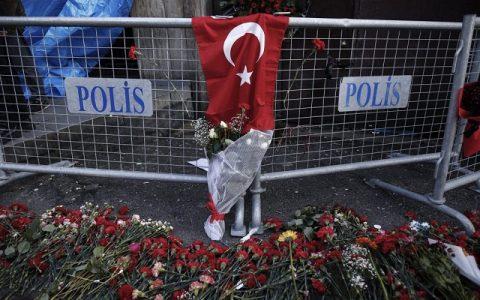
ISIS takes credit for Turkey nightclub attack that killed 39 people on New Year’s Eve
Just after the calendar flipped to 2017, gunfire broke out at a popular, posh nightclub in Istanbul. By the time the shooting was over, 39 people had been killed and dozens of others wounded.
Now, the Islamic State in Syria, commonly known as ISIS, is claiming responsibility for the shooter, who has not been identified and has reportedly evaded authorities in the Turkish capital.
This is the first attack in Turkey that ISIS has claimed.
“In continuation of the blessed operations which ISIS carries out against Turkey, a soldier of the brave caliphate attacked one of the most popular nightclubs while Christians were celebrating their holiday,” ISIS reportedly said in a statement posted to Twitter.
The shooting came just hours after another ISIS attack - a suicide bomb in the Iraqi capital of Baghdad - killed 27 people and injured more than 50 others. The group released graphic video of the explosion, which took place at a public market.
ISIS has been at the forefront of the conflicts in Iraq and Syria for years, but ISIS-driven violence in Turkey has taken a significant step up since 2015. Turkey is also combatting domestic unrest from the Kurdistan Workers Party (PKK), which has been demanding independence for a Kurdish-majority corner of the country for decades, and a militant offshoot of that group. The PKK disavowed Sunday’s shooting, saying that it “won’t target innocent and civilian people.”
“The Kurdish freedom fight is also the fight for democratization of Turkey,” the group reportedly said in a statement on Twitter.
While this is the first attack in Turkey claimed by ISIS, the group has been tied to other attacks in the country, including a bombing at the Istanbul airport.
President Recep Tayyip Erdogan has been nothing if not inconsistent in his approach to fighting the Islamic State, but this week’s events mark the country being drawn directly into the conflict.
Erdogan himself is an Islamist. Already, he has instated religious (Muslim) classes in public schools. And after he overcame an attempted military coup over the summer, many speculated Erdogan would use his subsequent rise in power to crack down on secularism and push Sharia-based policies. Erdogan’s response to the failed coup – ousting 9,000 civil workers from an opposing party - increased the country’s schism with the United States (even while the United States emphasized the importance of a democratic process).
Source: /Think Progress





